By Bernard Lavallée, R.D., M. Sc.
The Urban Nutritionist (nutritionnisteurbain.ca, in French only)
Cucumbers, cherry tomatoes, spinach, currants… And why not a few mustard seeds? I don’t think there is a more pleasant moment than when I make a salad with fresh fruits and vegetables that I’ve just picked from my own garden, yet it’s not in my small two-bedroom apartment in Montréal that you’d expect to find an abundance of edible plants.
Even if you only have a small amount of space, it’s possible to grow fruits, vegetables and herbs. They’re fresher and more nutritious because you eat them soon after you’ve picked them. Also, when you practice urban farming, it’s with local and often organic plants, so growing your own food is a concrete act that you can do for your health and for the health of our planet.
Want to try? Here are a few tricks for making your urban thumb greener without any headache!
Only have a small space?

If you only have a small space, seedlings and smaller plants are easy to grow inside in summer and winter. All you need is to buy seedlings, containers to germinate them in and a little light.
Choosing seedlings
There is a huge selection of nuts, seeds, cereals and legumes that you can germinate. The table below gives you the soaking and germination times of seedlings that are found easily in natural food stores or even grocery stores.
| Seeds | Soaking time | Germination time |
| Corn | 4 to 5 hours | 1 to 3 days |
| Broccoli | 4 to 6 hours | 5 to 6 days |
| Mung beans | 3 to 4 hours | 4 to 5 days |
| Lentils | 5 to 6 hours | 1 to 3 days |
| Alfalfa | 4 to 6 hours | 5 to 6 days |
| Mustard | Spray twice a day | 2 to 3 days |
| Peas | 8 to 12 hours | 2 days |
| Quinoa | 3 to 4 hours | 1 to 2 days |
| Radishes | 4 to 6 hours | 5 to 6 days |
| Sunflower | 3 to 4 hours | 4 to 12 days |
Purchase whole seeds that haven’t been cooked or subjected to a process that could damage or completely prevent germination.
How do I do that?
There are many types of sprouters on the market. It’s also really easy to build your own. Just take a mason jar and replace the cover with a cheesecloth held with an elastic. You want the seedlings to breath, but for the cheesecloth to keep them in the jar.
First, rinse the seedlings in the jar, then discard the water, but make sure to filter it to keep the seedlings! Fill the jar again, then let the seedlings soak for the recommended amount of time.
After soaking, just empty the water and leave the jar on a windowsill or in a lightly lit area. To prevent undesirable microorganisms from growing, rinse the seedlings every day.
How are they eaten?

When seedlings are ready, take advantage of them! They add a great freshness to soups and chowders, salads and sandwiches and are great on just about any dish.
Windowsill or balcony?
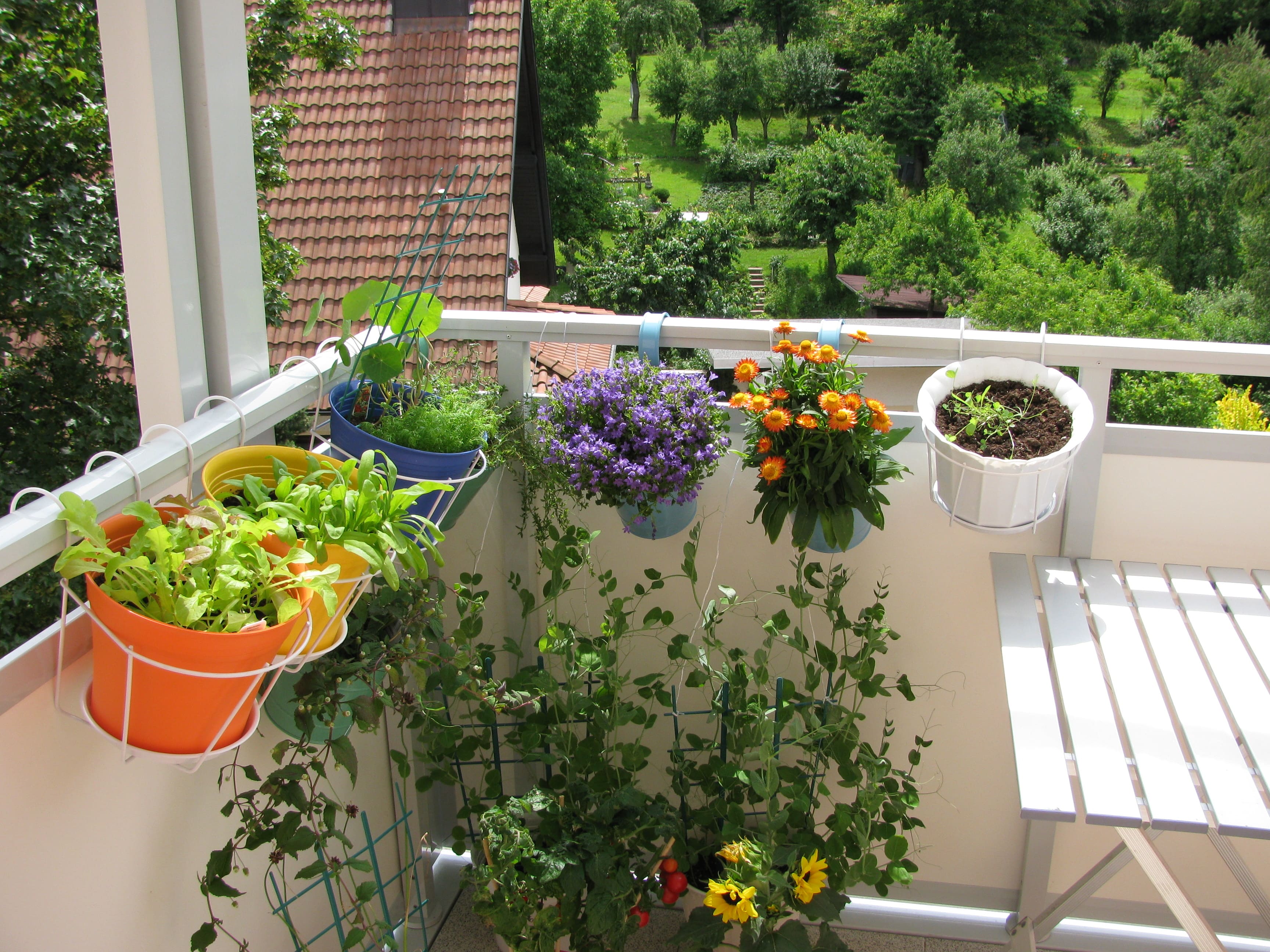
Some people only have a small windowsill for growing things while others have an entire balcony to work with. Here is some advice that will help you choose the plants that will best adapt to your reality.
Choosing pots
There is a pretty amazing variety of pots for growing plants.
Some have a saucer that allows you to water the plant and leave for the weekend without worrying about finding them dried out when you get back.
In urban farming, pots made with geotextiles are pretty popular. They’re lighter than other pots and help aerate roots better. The only disadvantage is that the soil can dry out a little faster.
You can also find different recovered pots here and there. Just make sure that they’re not made of toxic material and won’t degrade when coming in contact with water. Think about piercing a few holes in the bottom of these recycled pots so that water drains properly.
Regardless of the kind of pot you choose, keep this piece of advice in mind: always choose the biggest pot possible. We have a tendency to put plants in pots that are too small for their needs without thinking about how they’ll grow bigger during the summer season. The smaller the pot, the more quickly it will dry out and the less the plant will grow and produce.
The following table shows the minimum size to give to plants. Some varieties can adapt to growing in pots. Don’t hesitate to ask your nursery professional.
| Small pots (6 litres and bigger) | Herbes, nasturtium, lettuce |
| Medium pots (40 litres and bigger) | Hot peppers, bell peppers, Swiss chard, bok choy, kale, spinach, goose berries, beans, peas |
| Big pots (60 litres and bigger) | Tomatoes, eggplant, cucumber, zucchini, melons |
Choosing soil
Plants that require only a 6-litre pot can be grown on your windowsill, but results are better in the summer. In the winter, there aren’t enough hours of sunlight to adequately grow plants.
Today, there are soil types that are specially designed for growing in pots. They must contain a mix of black earth, compost and an element like coconut fibre to help retain and drain water.
Compost or fertilizer (preferably organic) must be added all season long as potted plants have higher nutritional needs. Plant compost, composted manure and algae emulsions are interesting products.
Taking care of plants

Most potted plants need six to eight hours of sunlight every day. Lettuce, spinach, peas, radishes, chive, parsley, mint and cabbage are a few other examples of plants can get away with a little less.
By scratching the soil’s surface with your finger, it’s easy to tell if a plant needs watering. If the first few centimetres of soil are dry, your plants are thirsty. People often think that there is an ideal time to water plants. That being said, it’s better to water your plants if the soil is dry – regardless of the time of day!
5 challenges for urban gardening
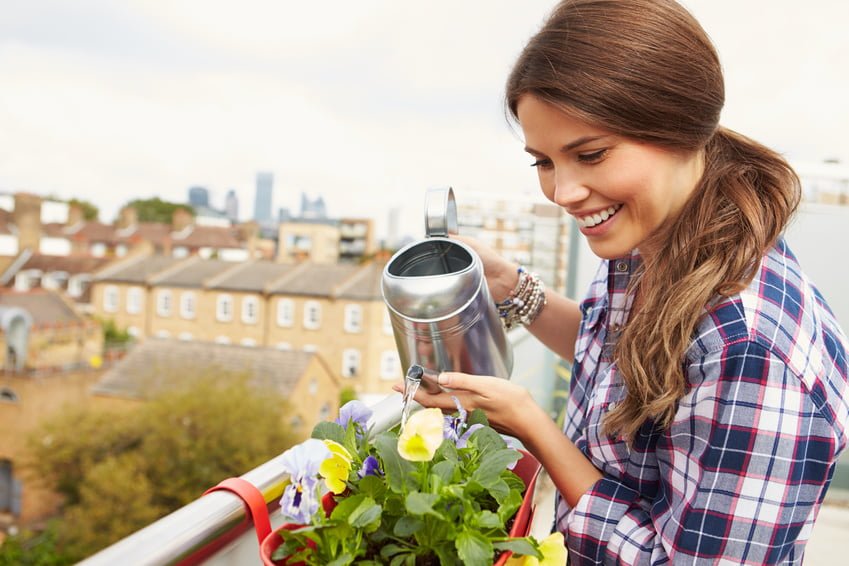
- The temperature can rise quickly on a balcony, so you must make sure that the soil doesn’t dry out too much. Check the soil’s moisture level often.
- Sometimes water can flow from the pot after watering and hit your neighbours below because of the drainage holes, so think about putting a saucer under your pots if you don’t live on the ground floor.
- Cats, raccoons, squirrels, pigeons… Urban fauna can be voracious. Citrus peels, pepper seeds, chicken manure or cages around plants are ways to keep undesirables away.
- Pollinators can be rare if you live higher than the third floor. This can reduce your plants’ productivity, so think about planting flowers that will attract them.
- After so much effort, you have to eat what you’ve grown! Beginner gardeners can sometimes forget to pick the fruits of their labour, but that’s a big mistake! Take advantage and congratulate yourself for growing so many delicious plants!

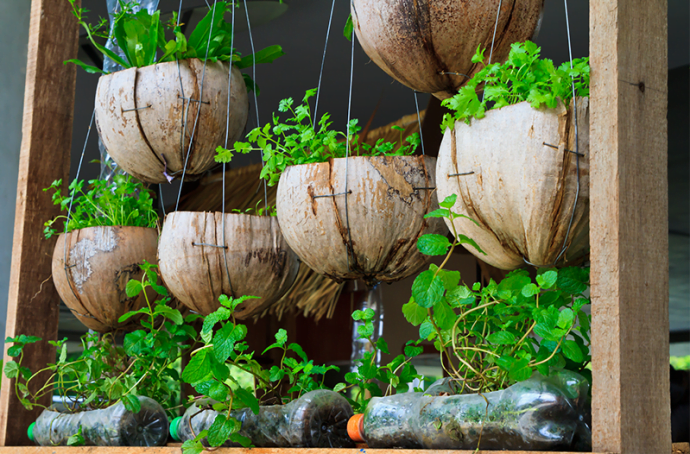
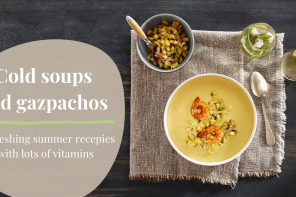
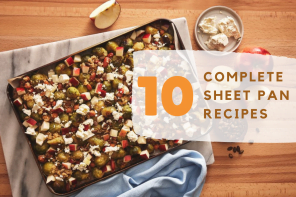

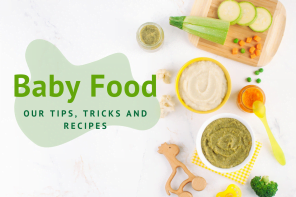



Faire du jardinage peut être vraiment difficile. Nous avons un jardin chez moi qui ne va pas très bien. Nous avons crée un système de drainage mais cela ne fonctionne pas bien apparemment. Comment peut-on corriger cette erreur?
Bonjour Marc,
Vous avez raison, s’occuper d’un jardin n’est pas toujours facile. La nature peut se révéler capricieuse.
Étant donné que nous ne sommes pas spécialistes en jardinage, nous vous recommandons cet article, qui explique les différentes méthodes de drainage et les autres solutions s’offrant à vous: http://www.gerbeaud.com/jardin/fiches/drainage-jardin-plantes-en-pots,1305.html
Nous espérons vous avoir été utiles. Bon jardinage 🙂